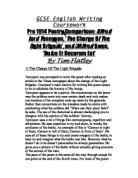The pace of the poem is the same all the way through except for one point at the end of the fourth verse. For most of the poem the pace is quite fast, with a rhythm comparable to the clatter of horses hooves (on purpose or by accident?). But near the end of the fourth verse, after speaking of the battle and the slaughter of many men, the pace slows for about one line. ‘Then they rode back, but not, Not the six hundred.’ The pause between ‘back’ and ‘but’ is cleverly used to emphasise the loss of life.
An image that recurs a lot in the poem is personification of the valley into which the Light Brigade rode into some kind of monster, a devourer of human life. The phrases ‘the jaws of Death’ and ‘mouth of Hell’ are used more than once, an important piece of imagery.
Alfred Lord Tennyson did not have first hand experience of the battle and it shows in the poem. The Charge Of The Light Brigade is very generalised, with the word ‘them’ constantly being used. No actions or fate of any specific soldier is mentioned; it’s always soldiers rather than soldier.
My personal reaction to his poem is that it would have been better for being written from first hand experience. It generalises the battle far more than is to my liking. I think Tennyson is writing in the same way that one of the men who charged would perhaps have written. I can’t help feeling that the soldiers, while very brave, were rather foolish to unquestioningly obey their orders. However whilst saying that it must be taken into account that people’s thoughts and feelings about war are far different now than they were then. People back then didn’t question whether it was right to go to war; it was always right to go to war.
2) Dulce Et Decorum Est
Dulce Et Decorum Est almost definitely written from first hand experience. Wilfred Owen was a soldier, and he defined himself as both a patriot and a pacifist. This poem is the product of the conflict of these feelings inside him. Wilfred Owen wants to show people through his poetry the very real horrors of war and dispel feelings in people that he perhaps once had. This seems to be in direct opposition of the opinion of Tennyson, who, while a worthy poet, had little or no first hand experience of battle. Tennyson concentrates on the heroism and the glory of war whereas Owen highlights the horror and atrocities, trying to get people back home in Britain to think again, to revise their opinions of war.
I think that the title might have held some personal significance to Owen; I think that before actually going to war he himself believed this. The title is ironic, as if he is directly arguing throughout the entire poem everything that the phrase means. In the poem he actually refers to it as ‘The old Lie’. Tennyson, on the other hand, appears to vehemently believe in the phrase. Part of this, once again, may be the fact that he hasn’t had first hand experience of battle but it also may be that The Charge Of The Light Brigade is a poem about a battle in which 247 people died whereas Owen is writing about a war in which an estimated 13,000,000 soldiers died. It is unsurprising that their standpoints differ so greatly.
Unlike The Charge Of The Light Brigade, the pace of Dulce Et Decorum Est is constantly fluctuating, in some parts fast and in others slow to reflect the changes of pace in the battle. The poem starts of slow to go with what is being described: the men trudging through mud and sludge. Then at the start of the second verse the pace suddenly speeds up, once again to go with what is being described. In this instance it is the panic of the soldiers as shells of mustard gas drop behind them and they have to put on their gas masks before the gas reaches them. The changes of pace in this poem are almost completely inverted from The Charge Of The Light Brigade. Most of The Charge Of The Light Brigade is fast-paced to reflect the pace of the battle and only at one point does it slow to emphasise the suffering and the loss of life, whereas Dulce Et Decorum Est is mostly slow to emphasise the suffering and misery and only speeds up in one place where suddenly the men are forced to move speedily.
There is one particularly affecting piece of imagery used in Dulce Et Decorum Est. At one point in the poem the company is gassed and one of the men is choking, seemingly drowning in the mustard gas. This appears to have been something Owen himself saw. ‘In all my dreams before my helpless sight, He plunges at me, guttering, choking, drowning.’ By comparison the worst imagery used by Tennyson, the ‘jaws of death’ seems pretty tame.
My response to this poem is very different to my response to The Charge Of The Light Brigade. Dulce Et Decorum Est is a powerful poem. It is the kind of poem that makes you want to go out and take part in an anti-war rally. The two poems seem to reflect the attitudes of the two eras. In the time of Crimean War few questioned whether it was right to go to war, whereas World War One was the first war where people really started to question the old beliefs. In an argument between Owen and Tennyson I would most definitely be on the side of Owen. He is the most qualified to write about war, having experienced for himself, as opposed to sitting on his backside at home reading about a battle in a newspaper.
The End







